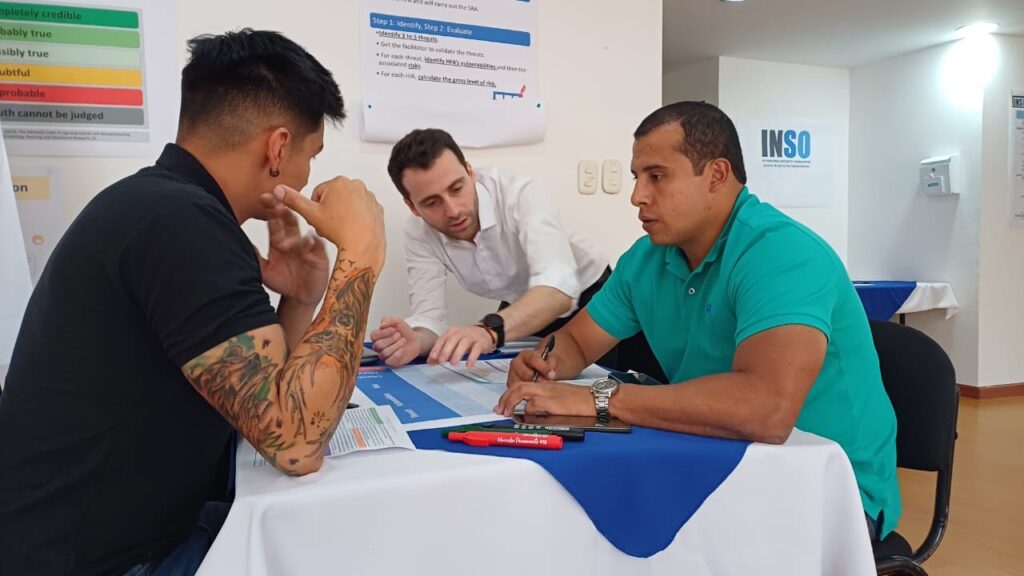léelo en español aquí
The start of INSO services in Colombia comes at a crucial time as the humanitarian landscape continues to demand increased collaboration and support for those working on the ground. In 2024, the humanitarian situation in Colombia deteriorated to its worst point in eight years, with 9.1 million people in need in 2025.
Humanitarian workers in Colombia face significant challenges related to safety and access, primarily due to ongoing violence from non-state armed groups and criminal organisations. Despite the 2016 peace agreement with the FARC, several armed and criminal groups continue to operate, leading to violence and new conflict dynamics that hinder humanitarian efforts.
These conflict dynamics not only endanger aid workers but also restrict their ability to reach vulnerable populations in need of assistance. The complex security environment necessitates that humanitarians engage with all actors to deliver aid effectively. This is particularly critical given that 90% of people live in areas of activity of armed groups.
To fulfill their mandate, it is imperative that humanitarians navigate these challenges to provide essential aid and protection to civilians.
Supporting NGOs in Colombia’s Humanitarian Landscape
Colombia is the largest humanitarian crisis in South America, with organisations addressing critical issues such as internal displacement, migration, disaster response, and community development. The complexities of operating in this challenging environment—including significant safety risks and logistical hurdles—underscore the need for robust support systems for NGOs.
Given the security and access landscape, in May 2023, NGOs in Colombia requested (through a letter of invitation) INSO to establish an NGO Security Platform in Colombia. Following a scoping mission in September 2023, INSO set about establishing a permanent presence, achieving legal registration in October 2024, allowing INSO to formalise our presence and setting the stage to onboard INSO’s team.
“The opening of the mission in Colombia responds to needs expressed by a wide variety of humanitarian actors in a conflict context which that, while protracted and receiving less media attention than other current crises (such as those in the Middle East or Ukraine), remains highly challenging.” says Etienne, INSO Country Director for Colombia “Since January 2025, Colombia has been experiencing one of the worst security and humanitarian crises in recent decades in the Catatumbo region. Here and elsewhere, humanitarians are facing new challenges, such as the explosive use of drones by armed actors. For INSO, this is a significant challenge, as the first mission in Latin America (and first Spanish-speaking country) and the second mission in the Americas in general after the mission in Haiti since 2022. The variety of armed actors and the multiple regional and cross-border dynamics, the interpenetration between armed conflicts and organised crime, major logistical and access challenges, the multiple risks linked to natural disasters in a particularly exposed country, and the age of conflict dynamics, which overlap with emerging dynamics, constitute a particularly complex environment for humanitarians.”
First Trainings Started in December
In December 2024, INSO’s Colombia team delivered its inaugural training sessions in Bogotá. These sessions were carefully designed to equip NGO personnel with the tools needed to navigate Colombia’s complex safety landscape. The trainings were met with positive feedback, highlighting the program’s relevance to the challenges faced by NGOs operating in Colombia. Topics covered included risk assessment, incident reporting, and best practices for field safety. Participants praised the practical approach and actionable insights offered by the sessions.
As services expanded in January 2025, we delivered our first sessions in Spanish and reached as far as Cucutá, a border town with Venezuela, reflecting INSO’s commitment to delivering support where it is needed most. January also marked the progressive implementation of services beyond training, starting with tailored regional products designed to address specific safety needs, and followed up in February of the first alerts, analysis reports, incident lists, and of the CHDC. The mission also ensures support for existing humanitarian coordination structures, particularly the NGO Forum, where INSO actively participates in monthly round tables dedicated to security issues, as well as in the Access Working Group, under the co-lead of OCHA and DRC.
Looking Ahead: Expanding Support and Services
Like most NGOs operating in the country, INSO has been affected by funding cuts from some donors. The project was nevertheless able to continue thanks to internal emergency funds mobilised by INSO and should be able to continue thanks to support from new donors.
In this context, three training sessions are being organised in April in Tibu, the epicenter of the recent crisis in the Catatumbo region, where, since January 2025, one of the worst security and humanitarian crises in the country in recent decades began. This mission also represents an important opportunity to deepen collaboration and enhance INSO’s capacity to serve the humanitarian community.
In the coming months, our objectives are to maintain and continue to develop the service offering, by continuing to deliver training in the regions most affected by conflict and access problems, by contributing to the development of tools adapted to the needs of humanitarians in the country, such as regional workshops on humanitarian access, and by developing INSO’s presence in the regions.
For more information about INSO’s services in Colombia, please contact info@col.ngosafety.org

